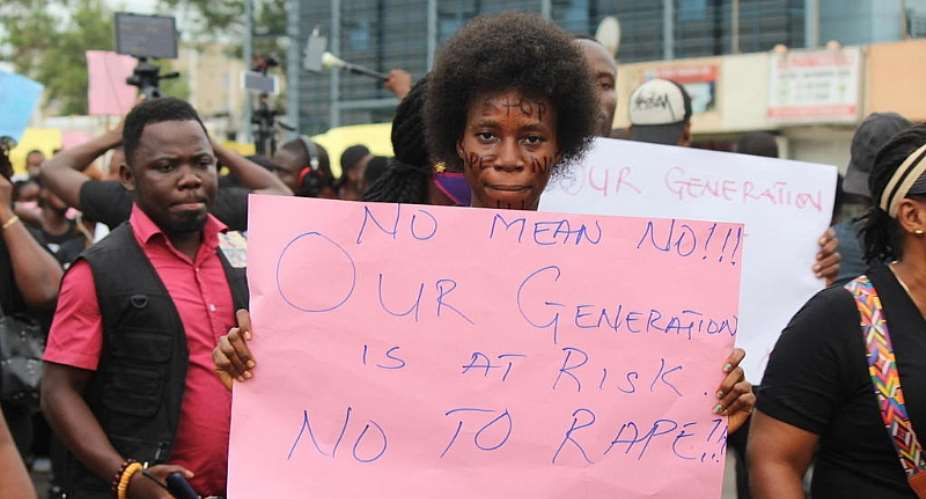Liberia's President George Weah has declared rape a national emergency after pressure from activists who are calling for better laws and more support to protect girls and women. The move will see 1.7 million euros allotted to the fight to stop gender and sexual violence.
Under the national rape emergency, Weah announced several measures, including the appointment of a special prosecutor for rape and the establishment of a National Sex Offender Registry and a National Security Taskforce on sexual and gender-based violence (SGBV), among others.
“We are witnessing an epidemic of rape within the Covid-19 pandemic, affecting mostly children and young girls across the country,” Weah said at a national anti-rape conference earlier this month.
According to feminist activists, over 900 cases of rape have been perpetrated against women and girls including acts of sodomy targeting under-aged males since the coronavirus hit.
Push for change
The presidential declaration comes two days after an anti-rape and sexual and gender-based violence conference in the capital Monrovia, aimed at highlighting the National Roadmap on rape and SGBV produced by the Inter-ministerial taskforce Weah recently set up.
The president insisted his administration will spare no effort in ensuring that sexual violence is curtailed. Additional measures, such as an executive order to protect the vulnerable and to ban harmful traditional practices such as Female Genital Mutilation, will also be introduced shortly, he said.
Organisers of the nationwide "March for Justice" demonstrations welcomed Weah's announcements.
“We are now going to monitor how effective the government is in implementing the SGBV roadmap,” Titus B. Pakalah, March for Justice director and lead campaigner told RFI.
Liberian women's rights activist and Nobel Peace laureate Leymah Gbowee praised the protesters for helping to bring about the new anti-rape laws.
'Dangerous' rape law
Activists are pushing the Liberian legislature to amend the rape law to ensure a harsher punishment for convicted rapists.
Rape is currently a non-bailable offence and perpetrators have no access to parole while serving their prison term.
- Liberia police tear-gas anti-rape protesters on third day of Monrovia march
- Liberia's self-proclaimed 'feminist president' Weah fails to nominate woman candidate
However, Nimba County lawmaker Samuel G. Kogar says the current law, a martial law, needs to be amended because people are taking advantage of it.
“As soon as you are accused of being a rapist, it's non-bailable. The law is dangerous,” he told RFI, saying that it allowed people to falsely accuse others, some of whom have been behind bars for years without trial.
To make the law fairer, Kogar says rape needs to become a bailable offence.
“Those accused of rape should be placed under bond and once they are found guilty, they should be sentenced to life imprisonment. That would be a good law and I will affix my signature to it,” he indicated.
Blaming the victim
The United Nations has long campaigned against the culture of blaming the victim – saying a women's behaviour or choice of clothing can incite rape or sexual assault.
This attitude is prevalent Liberia, according to a UN study that found 83 percent of people thought a woman's appearance could contribute to her chance of being assaulted.
MP Kogar shares the view, saying the way a woman dresses can serve as "provocation”.
Campaigner Pakalah rejects the attitude as "unbelievable".
“You cannot tell me because a lady wore a mini skirt it is enticing you to sexually abuse her," he says.
Despite the enduring culture of blaming the victim, activists say the government's move to implement the anti-rape roadmap is a strong step towards making Liberia a safe place for women and girls.





 SSNIT must be managed without gov’t interference – Austin Gamey
SSNIT must be managed without gov’t interference – Austin Gamey
 Ejisu by-election could go either way between NPP and independent candidate — Gl...
Ejisu by-election could go either way between NPP and independent candidate — Gl...
 We never asked ministers, DCEs to bring NPP apparatchiks for returning officer r...
We never asked ministers, DCEs to bring NPP apparatchiks for returning officer r...
 No one denigrated the commission when you appointed NDC sympathizers during your...
No one denigrated the commission when you appointed NDC sympathizers during your...
 Used cloth dealers protests over delayed Kumasi Central Market project
Used cloth dealers protests over delayed Kumasi Central Market project
 A/R: Kwadaso onion market traders refuse to relocate to new site
A/R: Kwadaso onion market traders refuse to relocate to new site
 Dumsor: Corn mill operators at Kaneshie market face financial crisis
Dumsor: Corn mill operators at Kaneshie market face financial crisis
 Jamestown fishermen seek support over destruction of canoes by Tuesday's heavy d...
Jamestown fishermen seek support over destruction of canoes by Tuesday's heavy d...
 Election 2024: EC to commence voter registration exercise on May 7
Election 2024: EC to commence voter registration exercise on May 7
 Public schools rebranding: We’re switching to blue and white, we’re painting all...
Public schools rebranding: We’re switching to blue and white, we’re painting all...
